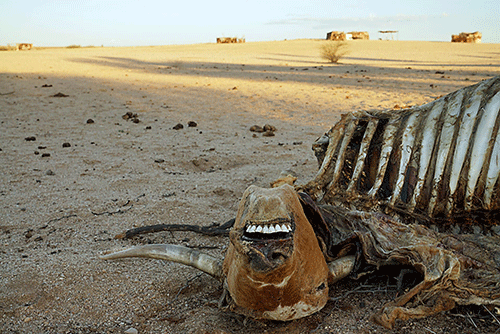Zebaldt Ngaruka
EPUKIRO – The slow delivery of drought relief aid, coupled with a lack of communication from their constituency offices with regards to various incentives being offered to farmers by the state, is forcing farmers in Omaheke to look at other ways to survive the drought.
The Omaheke region, which is regarded as one of Namibia’s most reliable agricultural backbones, has been battling drought since 2013, as most farmers have not fully-recovered from the severe droughts that have hit the country.
AgriToday caught up with farmer Kauku Hengari from the Otjombinde constituency’s Tier Vlei settlement, who said that it is difficult for farmers to fully-prepare for drought, as it always arrives in various unexpected ways and timeframes.
“It is something very difficult, and it comes at difficult times. Sometimes we hope for rain, and the weather people will also predict positive weather patterns, but then you just see things going in the opposite direction. I recently lost over 11 cattle, and have been trying hard on my own to save my remaining stock,as the announced government subsidy has not even reached us up until now. It [government subsidy] does not make any sense to me,” said Hengari, who is a pensioner.
He added: “I look after my breeding stock well and sell the old ones, but the challenge is the prices. The prices are just not good for us to sell, and that makes it challenging. The drought relief programme was maybe drafted by someone who does not have an idea about farming, especially in the communal setup. The idea of farmers selling, and getting subsidies, is not even a drop in the ocean.”
The veteran farmer further complained that the suggestion by the government for farmers to destock and buy animal feed in large stocks to get some sort of subsidy is not helping.
“I sold 15 cattle, and the prices were very bad, considering the deductions involved at auctions. Even the subsidy claims are taking long and in some cases only arrive when the animals have already died. They must use the same system or processes that they use when giving drought relief food to people. Use the same process to assist farmers with animal feed and other supplements.”
Also sharing similar sentiments is Hiarive Mbaha from the Aminuis constituency, who fumed that the government drought relief policy does not fit Omaheke, or the government does not want to assist Omaheke farmers.
The 87-year-old Mbaha recalled that during the drought of 2013, the government only gave farmers substandard crush feeds for their animals.
“Look at that joke. How will that feed cattle, and how many farmers have machines to crush those forages in the region?” he asked.
Mbaha, who owns three commercial farms, said drought requires every farmer to tighten his or her belt, as the government’s drought assistance policy will not help farmers, but contribute to more livestock deaths.
The renowned farmer advised that farmers in the region should rather farm with animals that fit their area.
“Here in Aminuis, our land is suitable for small stock, and most farmers are doing great in that type of farming,” said Mbaha, who advised cattle farmers not to always sell their old cows, as they are driving machines for reproduction.
“These old cows will give you calves every year. What you must do is give them attention instead of selling, because their prices are even lower at auctions.”
On the government’s subsidy claims, he condemned them as a waste of time, saying the bureaucracy involved is equal to death.
“How many people in our area are crying for claims, and how many are losing their livestock due to the long wait? This programme was not meant for Omaheke,” he said.
Mbaha also slammed the government resettlement programme, where people with donkeys are given large portions of land at the expense of cattle farmers who need land.
“Here, we have people from the northern region and Zambezi region who were given large portions of land, and the locals are left out. Even some are feeding in the corridors, which is not fair,” he added.
Asked about garden (crop) farming options, as Aminuis is known for having huge portions of underground water, Mbaha said that will depend on someone who likes gardens.
“We are known for livestock farming, and those who want to change to crops can do so per their own wish,” said the farmer.
In Epukiro constituency, Tiree Muundjua said drought is something one should prepare for well in advance.
“We are aware of the changes in climate and environmental conditions, amongst others.
So, it will be ideal for us to plan ahead. It pains me a lot to see fellow farmers transporting water with their cars during this difficult drought period.
The drought policy requires input from farmers, rather than from lawmakers,” he added.
Muundjua, who farms at Otjongaka Plot in Eiseb, said despite the drought, water scarcity in some villages is another concern.
Recently, President Nangolo Mbumba declared a state of emergency regarding the current drought, effective 22 May.
This declaration is detailed in a government gazette.
“I declare that, with effect from 22 May 2024, a state of emergency exists in Namibia on account of the persisting national disaster of drought that exists in all the regions of the Republic of Namibia,” the President announced.
-zngaruka@yahoo.com


